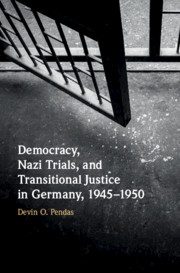Book contents
- Democracy, Nazi Trials, and Transitional Justice in Germany, 1945–1950
- Democracy, Nazi Trials, and Transitional Justice in Germany, 1945–1950
- Copyright page
- Contents
- Acknowledgments
- Introduction
- 1 Allied Justice and Its Discontents
- 2 Allied Policy toward German Courts
- 3 Debating Crimes against Humanity in the West
- 4 Debating Democracy in the East
- 5 The Trials That Did Not Happen
- Epilogue
- Bibliography
- Index
4 - Debating Democracy in the East
Published online by Cambridge University Press: 11 September 2020
- Democracy, Nazi Trials, and Transitional Justice in Germany, 1945–1950
- Democracy, Nazi Trials, and Transitional Justice in Germany, 1945–1950
- Copyright page
- Contents
- Acknowledgments
- Introduction
- 1 Allied Justice and Its Discontents
- 2 Allied Policy toward German Courts
- 3 Debating Crimes against Humanity in the West
- 4 Debating Democracy in the East
- 5 The Trials That Did Not Happen
- Epilogue
- Bibliography
- Index
Summary
This chapter argues that that Nazi trials in eastern Germany helped legitimate the emerging Stalinist dictatorship while remaining reasonably fair down until 1950. In forging their new dictatorship, the Socialist Unity Party (SED) relied on a nominal alliance with bourgeois and Social Democratic politicians. This alliance was based in part on a shared interest in punishing Nazi crimnals. Nazi trials in the East helped the SED identify and eliminate unreliable personnel among prosecutors and judges. More importantly, it helped craft and cement the justification for the new police state, by rationalizing denunciations to the new secret police (the Stasi) while criminalizing denunciations to the former secret police (the Gestapo). At the same time, these trials retained important due process protections for defendants. And, if Soviet complaints are to be believed, there were far more acquittals and modest punishments than the communists wanted. After the founding of the German Democratic Republic in 1949, though, this changed. In the so-called Waldheim trials of 1950, the prosecution of Nazi criminals became a classic example of authoritarian justice, with pre-determined outcomes and no due process. But this was a result of the new dictatorship, not its cause.
Keywords
- Type
- Chapter
- Information
- Publisher: Cambridge University PressPrint publication year: 2020

